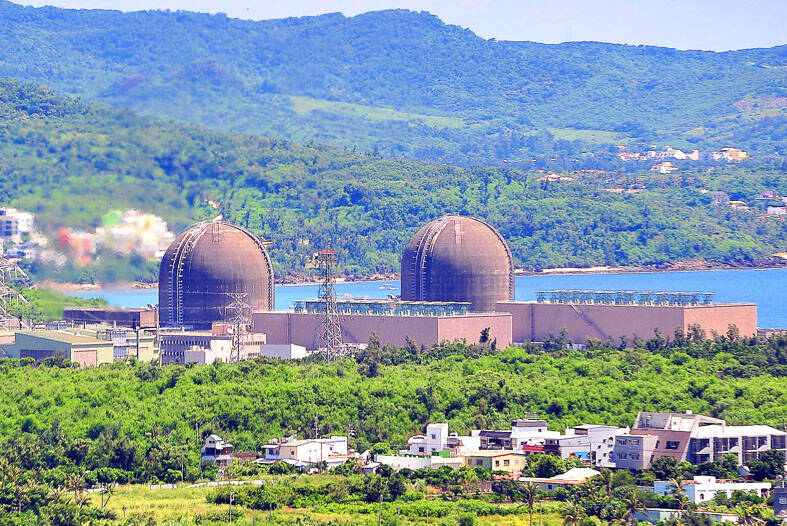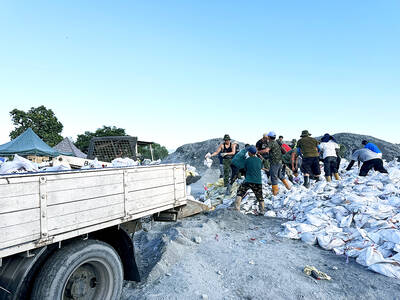The overwhelming support from participating voters in Saturday’s referendum on restarting the Ma-anshan Nuclear Power Plant in Pingtung County showed that nuclear energy remains a divisive issue and highlighted the need for a more diverse energy mix in Taiwan, academics said yesterday.
On the question “Do you agree that the Ma-anshan Nuclear Power Plant should continue operations upon approval by the competent authority and confirmation that there are no safety concerns?” 4,341,432 people, or about 73.5 percent of participating voters, cast “yes” ballots, the Central Election Commission said.
However the referendum still failed to pass, as it did not meet the required threshold of 5,000,523 affirmative votes, or 25 percent of eligible voters. Voter turnout was 29.53 percent.

Photo: Tsai Tsung-hsien, Taipei Times
The result means that Taiwan would remain without nuclear power, although the government has not ruled out reintroducing it.
“The failure to reach the threshold shows that controversy remains,” said Chen Jong-shun (陳中舜), an associate researcher at the Center for Green Economy of the Chung-Hua Institution for Economic Research.
Chen said that based on its project experience, Taiwan Power Co (Taipower) could, with broad social consensus, restart operations at the plant in “as little as two years.”
However, as there is no consensus “the future is still unclear,” he said.
Chen Shih-hau (陳詩豪), director-general of Research Division V of the Taiwan Institute of Economic Research, said that public opinion must be weighed when formulating energy security policy, otherwise it “only increases variables” in Taipower’s planning.
For example, the long-delayed Fourth Nuclear Power Plant in New Taipei City’s Gongliao District (貢寮), which never entered commercial operation, created supply pressures in northern Taiwan until a gas-fired generator at the Datan Power Plant in Taoyuan came online, he said.
The delays forced the continued operation of heavy oil-fired units at the Hsieh-ho Power Plant in Keelung, delaying the plant’s planned conversion from oil to natural gas, he said.
Chen Shih-hau said that restarting existing plants is less costly than building new ones, but shutting down large nuclear facilities has “a significant impact,” which is “why energy planning emphasizes diversification.”
National Chung Hsing University environmental engineering professor Tsuang Ben-jei (莊秉潔) said that the most feasible form of distributed energy is solar power with battery storage, followed by natural gas storage with gas-fired units and geothermal power.
Such power would cost about NT$5 to NT$10 per kilowatt-hour, Tsuang said.
State-run oil refiner CPC Corp, Taiwan operates a natural gas storage facility 3km underground in Miaoli County, which could supply Taiwan with 26 days of reserve energy, he said.
Restoring other natural underground storage sites could increase reserves to more than 600 days, he added.
Meanwhile, in the run-up to Saturday’s vote, many business leaders had voiced support for the referendum, including Lin Por-fong (林伯豐), chairman of the Third Wednesday Club, a prominent business association, citing concerns over stability.
Lin urged the government to rethink energy policy in a way that supports economic growth, ensuring a stable power supply and reasonable electricity prices.
“This cannot be achieved without nuclear power,” he said.
Pegatron Corp chairman Tung Tzu-hsien (童子賢) also believes that nuclear energy is vital for reducing carbon emissions, Lin said.
Tung — a vocal advocate for the referendum — on Saturday said that every unit of carbon-free electricity is precious, particularly with global carbon taxes on the horizon.
“Taiwan’s biggest problem is not a power shortage; that is only a potential pressure. Even more serious is the lack of carbon-free electricity,” he said.
Fossil fuel plants account for 79.7 percent of Taiwan’s electricity generation, including coal (31.1 percent), oil (1.4 percent) and natural gas (47.2 percent), Taipower data showed.
Renewables make up 11.9 percent, it showed.

Taipei, New Taipei City, Keelung and Taoyuan would issue a decision at 8pm on whether to cancel work and school tomorrow due to forecasted heavy rain, Keelung Mayor Hsieh Kuo-liang (謝國樑) said today. Hsieh told reporters that absent some pressing reason, the four northern cities would announce the decision jointly at 8pm. Keelung is expected to receive between 300mm and 490mm of rain in the period from 2pm today through 2pm tomorrow, Central Weather Administration data showed. Keelung City Government regulations stipulate that school and work can be canceled if rain totals in mountainous or low-elevation areas are forecast to exceed 350mm in

The Central Emergency Operations Center (CEOC) has made a three-phased compulsory evacuation plan for Hualien County’s Mataian River (馬太鞍溪) disaster zone ahead of the potential formation of a typhoon. The plan includes mandatory vertical evacuation using air-raid-style alarms if needed, CEOC chief coordinator Chi Lien-cheng (季連成) told a news conference in the county yesterday. Volunteers would be prohibited from entering the disaster area starting tomorrow, the retired general said. The first phase would be relocating vulnerable residents, including elderly people, disabled people, pregnant women and dialysis patients, in shelters and hospitals, he said. The second phase would be mandatory evacuation of residents living in

EVA Airways president Sun Chia-ming (孫嘉明) and other senior executives yesterday bowed in apology over the death of a flight attendant, saying the company has begun improving its health-reporting, review and work coordination mechanisms. “We promise to handle this matter with the utmost responsibility to ensure safer and healthier working conditions for all EVA Air employees,” Sun said. The flight attendant, a woman surnamed Sun (孫), died on Friday last week of undisclosed causes shortly after returning from a work assignment in Milan, Italy, the airline said. Chinese-language media reported that the woman fell ill working on a Taipei-to-Milan flight on Sept. 22

COUNTERMEASURE: Taiwan was to implement controls for 47 tech products bound for South Africa after the latter downgraded and renamed Taipei’s ‘de facto’ offices The Ministry of Foreign Affairs is still reviewing a new agreement proposed by the South African government last month to regulate the status of reciprocal representative offices, Minister of Foreign Affairs Lin Chia-lung (林佳龍) said yesterday. Asked about the latest developments in a year-long controversy over Taiwan’s de facto representative office in South Africa, Lin during a legislative session said that the ministry was consulting with legal experts on the proposed new agreement. While the new proposal offers Taiwan greater flexibility, the ministry does not find it acceptable, Lin said without elaborating. The ministry is still open to resuming retaliatory measures against South